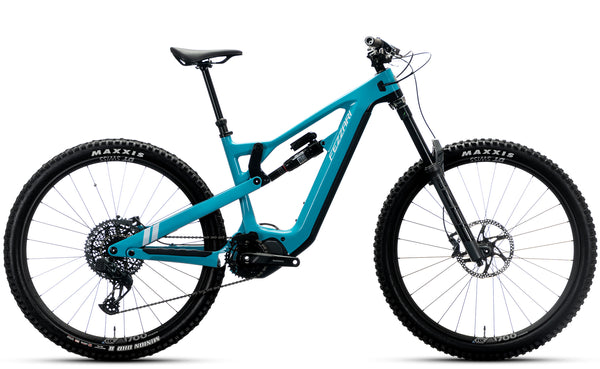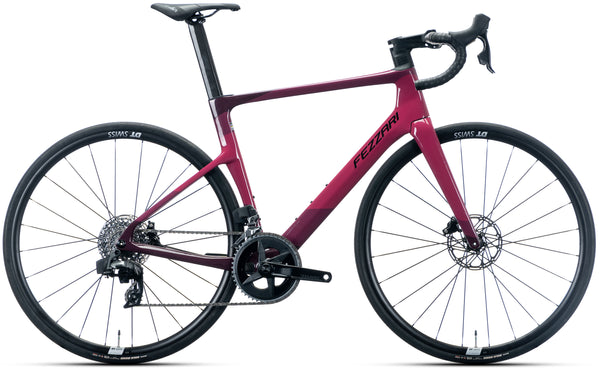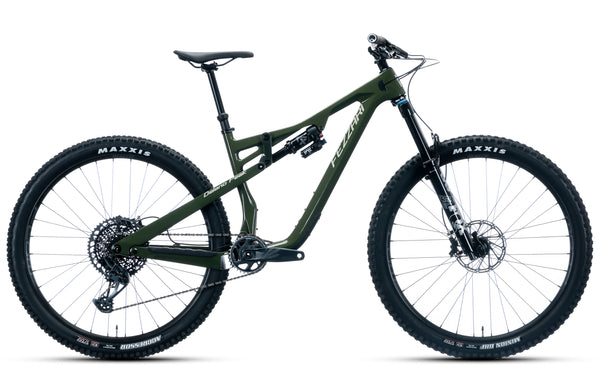Kelly Catale Qualifies for World Championships
Kelly has been racing bikes competitively for over nine years. She started competing as a road cyclist in college and was ranked 9th in the nation for collegiate cycling. After college, she transitioned to off-road disciplines after discovering some amazing New England singletrack. 2023 is Kelly’s 6th year as an elite endurance mountain bike racer. She is passionate about off-road racing, dedicated to training hard, and always searching for opportunities to improve her technical skills.
Kelly raced the first world cup in Nove Mesto and earned a very impressive 16th place. We sat down with Kelly and asked her how the race went.
How did you get into cycling?
I've always been an endurance athlete, starting with distance running in middle school until college. During the first semester of my freshman year at Bucknell University (2008), I broke my femur in the middle of a tempo run. The fracture was so severe that I couldn't run for an entire year. The grueling recovery resulted in me falling out of love with running, so I quit the team but still wanted to participate in a sport. A close friend suggested I might be good at cycling, so I bought a road bike and joined the Bucknell Cycling Club. The club was a group of people who shared local road bike adventures, and competed in Eastern Collegiate Cycling Conference races in the Spring. Those race weekends and the amazing community they fostered formed the origin story of my bike racing career.
When did you start racing?
My first mountain bike race was in August 2016. I was a recreational rider at the time and was not training to race but I had the competitive "itch", so naturally I chose one of the hardest local races -- the Hampshire 100 MTB race (a 100-mile, technical and hilly MTB race in New Hampshire). At mile 70 I was dead last and had bonked so hard that the race sweepers asked me to call someone to pick me up and bring me home, so I never finished the race. Somehow, that experience inspired me to try another crazy race the next year called the Vermont 50 (a 50-mile, technical and VERY hilly MTB race in Vermont). This time I did complete the race, despite still being relatively clueless about MTB racing. I started training seriously in the winter between 2017-2018 and ended up earning my Pro MTB license in the Spring of 2018.
You just got back from the first World Cup of the year, how is it different from World Championships?
Not only was the Nove Mesto MTB Marathon the first World Cup of the year, it was the first ever Cross-Country Marathon (XCM) World Cup race. In many ways, this race was very similar to the World Championships because it had the same amount of media coverage, spectators, official policies, and regulations as the XCM World Championships I have attended. With 15 countries represented in this race, many of the same women I have raced against at the World Championships were in attendance, and the stakes felt just as high. That said, this XCM race is part of the World Cup Series, so it is just one of four World Cup races happening throughout the season. Placement in this race contributes to the overall World Cup XCM standings. Also, anyone who places top-20 in a World Cup XCM race automatically qualifies for the XCM World Championships.
How did you do at the World Cup, what was the race like?
I finished 16th in the Elite Women's race!
The course was 120km (74.6miles), consisting of two 60km (37.3mile) laps, which is one of the longest MTB races I have done in a few years. The race course covered a wide range of terrain, including paved and gravel roads, rocky and muddy logging tracks, technical singletrack (i.e., lots of rocks and roots), and many climbs. The weather presented an interesting challenge for this race as well. In the days leading up to race day, the weather was cool but dry, which meant the trails and technical features were also dry. I sessioned the rock gardens several times with a couple of the American men, and we scoped out the most efficient lines for race day. Unfortunately, it rained hard the night before the race and was drizzling all morning, so the rock gardens and roots became extra slippery. The men started before the women, so by the time we reached the rock gardens there was mud and trail detritus covering all of the rocks, making them feel like they were ice covered. On lap 1, I got stuck behind a couple timid women and was forced to run my bike. But on lap 2, I slipped my way through the rocks, riding nearly all of the trail clean, which was a huge point of pride for me. As a true New Englander, I can say those rock gardens were my favorite part of the course by far.
My biggest challenge for this race was actually mental rather than physical. I really wanted to qualify for the World Championships automatically, so I put a lot of pressure on myself to achieve a top-20 finish. The days leading up to the race were consumed by performance anxiety and the weight of expectations. But when I started warming up on race day, I promised myself that I would do the best that I could on the day, and finish the race knowing I gave everything I could. I promised myself that I did not need to worry about results and just race in a way that would make myself proud.
Interestingly, I felt quite strong for most of the race and was not concerned about placement among the other women. When I was about 15 miles from the finish, my husband handed me a fresh bottle at one of the aid stations and told me that I was "in 22nd place and 20th place is not far ahead!" (note: it turns out I was actually already in 20th place, and Joe is notoriously bad at keeping track of placement mid-race). His enthusiasm ignited a spark in me, so when I could see the two women in front of me on the next climb, I slowly reigned them in, passed them both, AND then passed another two women! I felt like I was on fire in the last 15 miles, with a grin from ear to ear as I finished the race completely spent and genuinely happy.
Because of your result, you qualified for the World Championships. How much stress does it take off that you know you’re qualified?
Certainly there is a sense of relief knowing that I have a spot on the 2023 Team USA squad for the XCM World Championships in Scotland. This year's World Championships are unique because 13 different World Championship races, spanning most of the cycling disciplines (e.g., MTB, road, track, BMX), will be taking place over ten days in the same region of the world. I've always wanted to go to Scotland, and qualifying for this first-of-its-kind event was my biggest goal for the season.
What bike did you race the World Cup on? Why did you choose that bike?
Given the length and technical nature of the race, I chose my Fezzari Signal Peak, with 100mm fork and shock. My bike is set up with a suspension lockout so I can quickly convert the fork and shock from fully open to closed, which helped me adapt to the changing terrain. The bike's geometry and setup made it the perfect choice for this course because the bike climbs incredibly well and also handles technical terrain with confidence.
Did you do any changes to the bike once you got to the race? Do you do anything specific to your bike setup that is unique?
My mechanic (my husband) and I work to dial in the bike setup well before race day. We avoid making any major changes to the bike whenever possible on race day, because "new" usually introduces new potential failure modes. The race course terrain was so similar to the terrain back home in New England that we didn't need to make any adjustments to the bike once we arrived. The only change was throwing on brand new tires for extra confidence (Vittoria Mezcals, 29x2.25).
My bike setup is pretty straightforward, with Shimano XTR drivetrain and Industry Nine UL280 carbon wheels. I'd say the most unique part of my setup is the messages I write to myself on tape and affix to my handlebars and top tube. These messages serve as reminders, mantras, or key course notes, and they help me stay focused and calm when I'm feeling tired or anxious on the race course.






